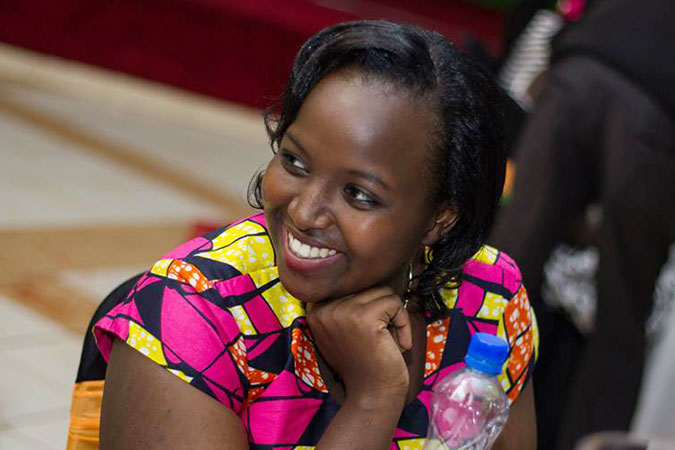Take five with Joy Chebet Bii: Why does digital literacy matter for women and girls?
Joy Chebet Bii is a 20-year-old living in Nairobi, Kenya. Joy, a student in mathematics and computer science at the Jomo Kenyatta University of Agriculture and Technology, is a Mozilla Club captain. Through a partnership between UN Women and The Mozilla Foundation, Mozilla Clubs teach web literacy skills to women and girls in Cape Town and Nairobi. Joy uses her expertise to teach girls in Kibera, the biggest slum in Nairobi, basic coding and digital literacy skills.Date:

Why is teaching girls and women digital skills so important?
Teaching girls and women digital skills is very important as having basic web and computer literacy skills help them in their day-to-day activities, be it running a business or doing school assignments. The club gives us the opportunity to teach digital skills to women and girls who may not get the opportunity to learn these skills anywhere else.
Girls and women with a good understanding of the digital space can impact the world through starting and joining mentorship programmes, passing on these skills through peer education, protecting themselves online and most importantly, they may be inspired to take up careers in ICT, which is still a male-dominated sector.
How is the partnership between UN Women and The Mozilla Foundation helping young women and girls unlock opportunities?
This partnership has created practical, user-friendly developer sites, such as Webmaker, a Mozilla open-source tool that helps to create and publish web sites while learning code. Students of the Victory Hope Club—where I teach—have been able to learn basic HTML, understand the structure of a web page and create one. They have also been able to create memes, newspaper articles and other websites.
Having a girl-focused club also creates a relaxed and safe environment for the girls to share life experiences, complement each other’s skills and receive mentorship from their club captain and other female teachers.
How has running your own Mozilla Club impacted your perspective on digital literacy for women and girls?
The past three months of running my Mozilla Club has shifted my perspective on digital literacy among women and girls. I used to think that through the current educational system, students have adequate access to ICT skills and learning resources, but the reality on the ground is quite different. Some schools, especially those in low-income areas such as in Kibera, where I run an after-school club, don’t even have a single computer nor a computer teacher. And if girls and women do not have access to learning ICT skills, they are missing out on big opportunities.
What’s next for your Mozilla Club?
For the new school term, my club intends to build upon the basic web literacy skills they’ve already learnt. I want to teach them simple programming, privacy basics and possibly undertake a small project to document all they’ve learnt.
On World Teachers’ Day, 5 October, what is your message to teachers around the world?
To teachers around the world, I say keep on passing knowledge, inspiring students and changing lives. Having been ‘Teacher Joy’ for the past few months, I know the satisfaction you get when students learn something and appreciate new content. I hope to see the day when every girl in Kibera is web literate.